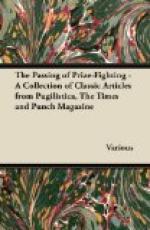The yeomanry, not in the least dispirited by this reverse, plan a fresh attack, and hearing that reinforcements are en route, in the persons of the drawing, dancing, and writing masters of the “Boarding School,” cut off their march, and obtain a second entrance into the enemy’s camp, under false colours; which their accomplishments enable them to do, for the captain is a good penman, the lieutenant dances and plays the fiddle, and the cornet draws to admiration, especially—“at a month.” Under such instructors the young ladies make great progress, the governess being absent to see after the imaginary daughter of a fictitious Earl of Aldgate. On her return, however, she finds her pupils in a state of great insubordination, and suspecting the teachers to be incendiaries, calls in a major of yeomanry (who, unlike the rest of his troop, is an ally of the lady), to put them out. The invaders, however, retreat by the window, but soon return by the door in their uniform, to assist their major in quelling the fears of the minors, and to complete the course of instruction pursued at the Haymarket “Boarding School.”
Mr. J. Webster, as Captain Harcourt, played as well as he could: and so did Mr. Webster as Lieutenant Varley, which was very well indeed, for he cannot perform anything badly, were he to try. An Irish cornet, in the mouth of Mr. F. Vining, was bereft of his proper brogue; but this loss was the less felt, as Mr. Gough personated the English Major with the rale Tipperary tongue. Mrs. Grosdenap was a perfect governess in the hands of Mrs. Clifford, and the hoydens she presided over exhibited true specimens of a finishing school, especially Miss P. Horton;—that careful and pleasing artiste, who stamps character upon everything she does, and individuality upon everything she says. In short, all the parts in the “Boarding School” are so well acted, that one cannot help regretting when it breaks up for the evening. The circulars issued by its proprietors announce that it will be open every night, from ten till eleven, up to the Christmas holidays.
As a subject, this is a perfectly fair, nay, moral one; despite some silly opinions that have stated to the contrary. Satire, when based upon truth, is the highest province of the stage, which enables us to laugh away folly and wickedness, when they cannot be banished by direct exposure. Ladies’ boarding-schools form, in the mass, a gross and fearful evil, to which the Haymarket author has cleverly awakened attention. Why they are an evil, might be easily proved, but a theatrical critique in PUNCH is not precisely the place for a discussion on female education.
* * * * *
ENJOYMENT.
The “Council of the Dramatic Authors’ Theatre” enticed us from home on Monday last, by promising what as yet they have been unable to perform—“Enjoyment.” As usual, they obtained our company under false pretences: for if any “enjoyment” were afforded by their new farce, the actors had it all to themselves.




